Jean-Paul Sartre est un Acteur et Scénariste Français né le 21 juin 1905 à Paris (France)
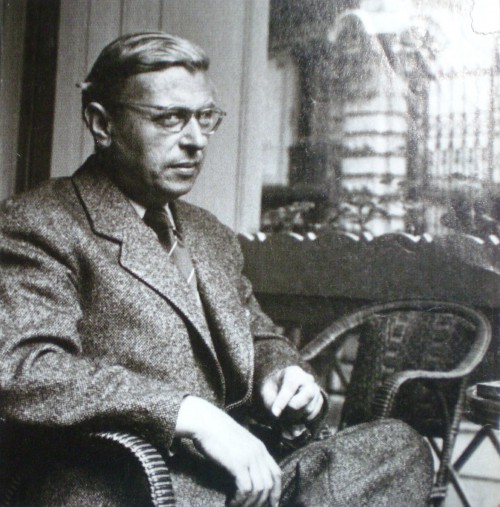
Jean-Paul Charles Aymard Sartre (/ˈsɑrtrə/; [saʁtʁ]; 21 June 1905 – 15 April 1980) was a French philosopher, playwright, novelist, screenwriter, political activist, biographer, and literary critic. He was one of the key figures in the philosophy of existentialism and phenomenology, and one of the leading figures in 20th-century French philosophy and Marxism.
His work has also influenced sociology, critical theory, post-colonial theory, and literary studies, and continues to influence these disciplines. Sartre has also been noted for his open relationship with the prominent feminist theorist Simone de Beauvoir.
He was awarded the 1964 Nobel Prize in Literature and refused it, saying that he always declined official honors and that "a writer should not allow himself to be turned into an institution".
Jean-Paul Sartre was born in Paris as the only child of Jean-Baptiste Sartre, an officer of the French Navy, and Anne-Marie Schweitzer. His mother was of Alsatian origin and the first cousin of Nobel Prize laureate Albert Schweitzer. (Her father, Charles Schweitzer, was the older brother of Albert Schweitzer's father, Louis Théophile.)
When Sartre was two years old, his father died of a fever. Anne-Marie moved back to her parents' house in Meudon, where she raised Sartre with help from her father, a teacher of German who taught Sartre mathematics and introduced him to classical literature at a very early age. When he was twelve, Sartre's mother remarried, and the family moved to La Rochelle, where he was frequently bullied.
As a teenager in the 1920s, Sartre became attracted to philosophy upon reading Henri Bergson's essay Time and Free Will: An Essay on the Immediate Data of Consciousness. He studied and earned a degree in philosophy in Paris at the École Normale Supérieure, an institution of higher education that was the alma mater for several prominent French thinkers and intellectuals. It was at ENS that Sartre began his lifelong, sometimes fractious, friendship with Raymond Aron. Sartre was influenced by many aspects of Western philosophy, adopting ideas from Immanuel Kant, Georg Wilhelm Friedrich Hegel, Søren Kierkegaard, Edmund Husserl and Martin Heidegger, among others. Perhaps the most decisive influence on Sartre's philosophical development was his weekly attendance at Alexandre Kojève's seminars, which continued for a number of years.
From his first years in the École Normale, Sartre was one of its fiercest pranksters; In 1927, his antimilitarist satirical cartoon in the revue of the school, coauthored with Georges Canguilhem, particularly upset the director Gustave Lanson. In the same year, with his comrades Nizan, Larroutis, Baillou and Herland, he organized a media prank following Charles Lindbergh's successful New York-Paris flight; Sartre & Co. called newspapers and informed them that Lindbergh was going to be awarded an honorary École degree. Many newspapers, including Le Petit Parisien, announced the event on 25 May. Thousands, including journalists and curious spectators, showed up, unaware that what they were witnessing was a stunt involving a Lindbergh look-alike. The public's resultant outcry forced Lanson to resign.
In 1929 at the École Normale, he met Simone de Beauvoir, who studied at the Sorbonne and later went on to become a noted philosopher, writer, and feminist. The two became inseparable and lifelong companions, initiating a romantic relationship, though they were not monogamous. The first time Sartre took the exam to become a college instructor, he failed. But he took it a second time and was first in his class, with Beauvoir second.
Sartre was drafted into the French Army from 1939 to 1941 and served as a meteorologist for some time. He later argued in 1959 that each French person was responsible for the collective crimes during the Algerian War of Independence.
Together, Sartre and de Beauvoir challenged the cultural and social assumptions and expectations of their upbringings, which they considered bourgeois, in both lifestyle and thought. The conflict between oppressive, spiritually destructive conformity (mauvaise foi, literally, "bad faith") and an "authentic" way of "being" became the dominant theme of Sartre's early work, a theme embodied in his principal philosophical work L'Être et le Néant (Being and Nothingness) (1943). Sartre's introduction to his philosophy is his work Existentialism and Humanism (1946), originally presented as a lecture.
World War II
In 1939 Sartre was drafted into the French army, where he served as a meteorologist. He was captured by German troops in 1940 in Padoux, and he spent nine months as a prisoner of war—in Nancy and finally in Stalag 12D, Trier, where he wrote his first theatrical piece, Barionà, fils du tonnerre, a drama concerning Christmas. It was during this period of confinement that Sartre read Heidegger's Being and Time, later to become a major influence on his own essay on phenomenological ontology. Because of poor health (he claimed that his poor eyesight and exotropia affected his balance) Sartre was released in April 1941. Given civilian status, he recovered his teaching position at Lycée Pasteur near Paris, settled at the Hotel Misgiven a new position at Lycée Condorcet, replacing a Jewish teacher who had been forbidden to teach by Vichy law.
After coming back to Paris in May 1941, he participated in the founding of the underground group Socialisme et Liberté with other writers de Beauvoir, Maurice Merleau-Ponty, Jean-Toussaint Desanti and his wife Dominique Desanti, Jean Kanapa, and École Normale students. In August Sartre and de Beauvoir went to the French Riviera seeking the support of André Gide and André Malraux. However, both Gide and Malraux were undecided, and this may have been the cause of Sartre's disappointment and discouragement. Socialisme et liberté soon dissolved and Sartre decided to write instead of being involved in active resistance. He then wrote Being and Nothingness, The Flies, and No Exit, none of which was censored by the Germans, and also contributed to both legal and illegal literary magazines.
After August 1944 and the Liberation of Paris, he wrote Anti-Semite and Jew. In the book he tries to explain the etiology of "hate" by analyzing antisemitic hate. Sartre was a very active contributor to Combat, a newspaper created during the clandestine period by Albert Camus, a philosopher and author who held similar beliefs. Sartre and de Beauvoir remained friends with Camus until 1951, with the publication of Camus's The Rebel. Later, while Sartre was labeled by some authors as a resistant, the French philosopher and resistant Vladimir Jankelevitch criticized Sartre's lack of political commitment during the German occupation, and interpreted his further struggles for liberty as an attempt to redeem himself. According to Camus, Sartre was a writer who resisted, not a resister who wrote.
In 1945, after the war ended, Sartre moved to an apartment on the rue Bonaparte which was where he was to produce most of his subsequent work, and where he lived until 1962. It was from there that he helped establish a quarterly literary and political review, Les Temps Modernes (Modern Times), in part to popularize his thought. He ceased teaching and devoted his time to writing and political activism. He would draw on his war experiences for his great trilogy of novels, Les Chemins de la Liberté (The Roads to Freedom) (1945–1949).
Cold War politics and anticolonialism
The first period of Sartre's career, defined in large part by Being and Nothingness (1943), gave way to a second period—when the world was perceived as split into communist and capitalist blocs—of highly publicized political involvement. His 1948 play Les mains sales (Dirty Hands) in particular explored the problem of being a politically "engaged" intellectual. He embraced Marxism, but did not join the Communist Party. While a Marxist, Sartre attacked what he saw as abuses of freedom and human rights by the Soviet Union. He was one of the first French journalists to expose the existence of the slave labor camps, and vehemently opposed the invasion of Hungary, Russian anti-Semitism, and the execution of dissidents. As an anti-colonialist, Sartre took a prominent role in the struggle against French rule in Algeria, and the use of torture and concentration camps by the French in Algeria. He became an eminent supporter of the FLN in the Algerian War and was one of the signatories of the Manifeste des 121. Consequently, Sartre became a domestic target of the paramilitary Organisation de l'armée secrète (OAS), escaping two bomb attacks in the early '60s. (He had an Algerian mistress, Arlette Elkaïm, who became his adopted daughter in 1965.) He opposed U.S. involvement in the Vietnam War and, along with Bertrand Russell and others, organized a tribunal intended to expose U.S. war crimes, which became known as the Russell Tribunal in 1967.
His work after Stalin's death, the Critique de la raison dialectique (Critique of Dialectical Reason), appeared in 1960 (a second volume appearing posthumously). In the Critique Sartre set out to give Marxism a more vigorous intellectual defense than it had received until then; he ended by concluding that Marx's notion of "class" as an objective entity was fallacious. Sartre's emphasis on the humanist values in the early works of Marx led to a dispute with a leading leftist intellectual in France in the 1960s, Louis Althusser, who claimed that the ideas of the young Marx were decisively superseded by the "scientific" system of the later Marx.
Sartre went to Cuba in the 1960s to meet Fidel Castro and spoke with Ernesto "Che" Guevara. After Guevara's death, Sartre would declare him to be "not only an intellectual but also the most complete human being of our age" and the "era's most perfect man." Sartre would also compliment Guevara by professing that "he lived his words, spoke his own actions and his story and the story of the world ran parallel." However he stood against the persecution of gays by Castro's régime, which he compared to Nazi persecution of the Jews, and said: "Homosexuals are Cuba's Jews".
During a collective hunger strike in 1974, Sartre visited Red Army Faction leader Andreas Baader in Stammheim Prison and criticized the harsh conditions of imprisonment. Towards the end of his life, Sartre became an anarchist.
Late life and death
In 1964 Sartre renounced literature in a witty and sardonic account of the first ten years of his life, Les mots (Words). The book is an ironic counterblast to Marcel Proust, whose reputation had unexpectedly eclipsed that of André Gide (who had provided the model of littérature engagée for Sartre's generation). Literature, Sartre concluded, functioned ultimately as a bourgeois substitute for real commitment in the world. In October 1964, Sartre was awarded the Nobel Prize in Literature but he declined it. He was the first Nobel Laureate to voluntarily decline the prize, and he had previously refused the Légion d'honneur, in 1945. The prize was announced on 22 October 1964; on 14 October, Sartre had written a letter to the Nobel Institute, asking to be removed from the list of nominees, and warning that he would not accept the prize if awarded, but the letter went unread; on 23 October, Le Figaro published a statement by Sartre explaining his refusal. He said he did not wish to be "transformed" by such an award, and did not want to take sides in an East vs. West cultural struggle by accepting an award from a prominent Western cultural institution. After being awarded the prize he tried to escape the media by hiding in the house of Simone's sister Hélène de Beauvoir in Goxwiller, Alsace.
Though his name was then a household word (as was "existentialism" during the tumultuous 1960s), Sartre remained a simple man with few possessions, actively committed to causes until the end of his life, such as the May 1968 strikes in Paris during the summer of 1968 during which he was arrested for civil disobedience. President Charles de Gaulle intervened and pardoned him, commenting that "you don't arrest Voltaire."
In 1975, when asked how he would like to be remembered, Sartre replied:
I would like [people] to remember Nausea, [my plays] No Exit and The Devil and the Good Lord, and then my two philosophical works, more particularly the second one, Critique of Dialectical Reason. Then my essay on Genet, Saint Genet.... If these are remembered, that would be quite an achievement, and I don't ask for more. As a man, if a certain Jean-Paul Sartre is remembered, I would like people to remember the milieu or historical situation in which I lived,... how I lived in it, in terms of all the aspirations which I tried to gather up within myself.
Sartre's physical condition deteriorated, partially because of the merciless pace of work (and using drugs for this reason, i.e., amphetamine) he put himself through during the writing of the Critique and a massive analytical biography of Gustave Flaubert (The Family Idiot), both of which remained unfinished. He became almost completely blind in 1973. Sartre was a notorious chain smoker, which could also have contributed to the deterioration of his health.
Sartre died 15 April 1980 in Paris from edema of the lung. He lies buried in Cimetière de Montparnasse in Paris. His funeral was well attended, with estimates of the number of mourners along the two hour march ranging from 15,000 to over 50,000.
Source : Wikidata
Jean-Paul Sartre

- Infos
- Photos
- Meilleurs films
- Famille
- Personnages
- Récompenses
Nom de naissance Jean-Paul Charles Aymard Sartre
Nationalité France
Naissance 21 juin 1905 à Paris (France)
Mort 15 avril 1980 (à 74 ans) à Paris (France)
Récompenses Prix Nobel de littérature
Nationalité France
Naissance 21 juin 1905 à Paris (France)
Mort 15 avril 1980 (à 74 ans) à Paris (France)
Récompenses Prix Nobel de littérature
His work has also influenced sociology, critical theory, post-colonial theory, and literary studies, and continues to influence these disciplines. Sartre has also been noted for his open relationship with the prominent feminist theorist Simone de Beauvoir.
He was awarded the 1964 Nobel Prize in Literature and refused it, saying that he always declined official honors and that "a writer should not allow himself to be turned into an institution".
Biographie
Early lifeJean-Paul Sartre was born in Paris as the only child of Jean-Baptiste Sartre, an officer of the French Navy, and Anne-Marie Schweitzer. His mother was of Alsatian origin and the first cousin of Nobel Prize laureate Albert Schweitzer. (Her father, Charles Schweitzer, was the older brother of Albert Schweitzer's father, Louis Théophile.)
When Sartre was two years old, his father died of a fever. Anne-Marie moved back to her parents' house in Meudon, where she raised Sartre with help from her father, a teacher of German who taught Sartre mathematics and introduced him to classical literature at a very early age. When he was twelve, Sartre's mother remarried, and the family moved to La Rochelle, where he was frequently bullied.
As a teenager in the 1920s, Sartre became attracted to philosophy upon reading Henri Bergson's essay Time and Free Will: An Essay on the Immediate Data of Consciousness. He studied and earned a degree in philosophy in Paris at the École Normale Supérieure, an institution of higher education that was the alma mater for several prominent French thinkers and intellectuals. It was at ENS that Sartre began his lifelong, sometimes fractious, friendship with Raymond Aron. Sartre was influenced by many aspects of Western philosophy, adopting ideas from Immanuel Kant, Georg Wilhelm Friedrich Hegel, Søren Kierkegaard, Edmund Husserl and Martin Heidegger, among others. Perhaps the most decisive influence on Sartre's philosophical development was his weekly attendance at Alexandre Kojève's seminars, which continued for a number of years.
From his first years in the École Normale, Sartre was one of its fiercest pranksters; In 1927, his antimilitarist satirical cartoon in the revue of the school, coauthored with Georges Canguilhem, particularly upset the director Gustave Lanson. In the same year, with his comrades Nizan, Larroutis, Baillou and Herland, he organized a media prank following Charles Lindbergh's successful New York-Paris flight; Sartre & Co. called newspapers and informed them that Lindbergh was going to be awarded an honorary École degree. Many newspapers, including Le Petit Parisien, announced the event on 25 May. Thousands, including journalists and curious spectators, showed up, unaware that what they were witnessing was a stunt involving a Lindbergh look-alike. The public's resultant outcry forced Lanson to resign.
In 1929 at the École Normale, he met Simone de Beauvoir, who studied at the Sorbonne and later went on to become a noted philosopher, writer, and feminist. The two became inseparable and lifelong companions, initiating a romantic relationship, though they were not monogamous. The first time Sartre took the exam to become a college instructor, he failed. But he took it a second time and was first in his class, with Beauvoir second.
Sartre was drafted into the French Army from 1939 to 1941 and served as a meteorologist for some time. He later argued in 1959 that each French person was responsible for the collective crimes during the Algerian War of Independence.
Together, Sartre and de Beauvoir challenged the cultural and social assumptions and expectations of their upbringings, which they considered bourgeois, in both lifestyle and thought. The conflict between oppressive, spiritually destructive conformity (mauvaise foi, literally, "bad faith") and an "authentic" way of "being" became the dominant theme of Sartre's early work, a theme embodied in his principal philosophical work L'Être et le Néant (Being and Nothingness) (1943). Sartre's introduction to his philosophy is his work Existentialism and Humanism (1946), originally presented as a lecture.
World War II
In 1939 Sartre was drafted into the French army, where he served as a meteorologist. He was captured by German troops in 1940 in Padoux, and he spent nine months as a prisoner of war—in Nancy and finally in Stalag 12D, Trier, where he wrote his first theatrical piece, Barionà, fils du tonnerre, a drama concerning Christmas. It was during this period of confinement that Sartre read Heidegger's Being and Time, later to become a major influence on his own essay on phenomenological ontology. Because of poor health (he claimed that his poor eyesight and exotropia affected his balance) Sartre was released in April 1941. Given civilian status, he recovered his teaching position at Lycée Pasteur near Paris, settled at the Hotel Misgiven a new position at Lycée Condorcet, replacing a Jewish teacher who had been forbidden to teach by Vichy law.
After coming back to Paris in May 1941, he participated in the founding of the underground group Socialisme et Liberté with other writers de Beauvoir, Maurice Merleau-Ponty, Jean-Toussaint Desanti and his wife Dominique Desanti, Jean Kanapa, and École Normale students. In August Sartre and de Beauvoir went to the French Riviera seeking the support of André Gide and André Malraux. However, both Gide and Malraux were undecided, and this may have been the cause of Sartre's disappointment and discouragement. Socialisme et liberté soon dissolved and Sartre decided to write instead of being involved in active resistance. He then wrote Being and Nothingness, The Flies, and No Exit, none of which was censored by the Germans, and also contributed to both legal and illegal literary magazines.
After August 1944 and the Liberation of Paris, he wrote Anti-Semite and Jew. In the book he tries to explain the etiology of "hate" by analyzing antisemitic hate. Sartre was a very active contributor to Combat, a newspaper created during the clandestine period by Albert Camus, a philosopher and author who held similar beliefs. Sartre and de Beauvoir remained friends with Camus until 1951, with the publication of Camus's The Rebel. Later, while Sartre was labeled by some authors as a resistant, the French philosopher and resistant Vladimir Jankelevitch criticized Sartre's lack of political commitment during the German occupation, and interpreted his further struggles for liberty as an attempt to redeem himself. According to Camus, Sartre was a writer who resisted, not a resister who wrote.
In 1945, after the war ended, Sartre moved to an apartment on the rue Bonaparte which was where he was to produce most of his subsequent work, and where he lived until 1962. It was from there that he helped establish a quarterly literary and political review, Les Temps Modernes (Modern Times), in part to popularize his thought. He ceased teaching and devoted his time to writing and political activism. He would draw on his war experiences for his great trilogy of novels, Les Chemins de la Liberté (The Roads to Freedom) (1945–1949).
Cold War politics and anticolonialism
The first period of Sartre's career, defined in large part by Being and Nothingness (1943), gave way to a second period—when the world was perceived as split into communist and capitalist blocs—of highly publicized political involvement. His 1948 play Les mains sales (Dirty Hands) in particular explored the problem of being a politically "engaged" intellectual. He embraced Marxism, but did not join the Communist Party. While a Marxist, Sartre attacked what he saw as abuses of freedom and human rights by the Soviet Union. He was one of the first French journalists to expose the existence of the slave labor camps, and vehemently opposed the invasion of Hungary, Russian anti-Semitism, and the execution of dissidents. As an anti-colonialist, Sartre took a prominent role in the struggle against French rule in Algeria, and the use of torture and concentration camps by the French in Algeria. He became an eminent supporter of the FLN in the Algerian War and was one of the signatories of the Manifeste des 121. Consequently, Sartre became a domestic target of the paramilitary Organisation de l'armée secrète (OAS), escaping two bomb attacks in the early '60s. (He had an Algerian mistress, Arlette Elkaïm, who became his adopted daughter in 1965.) He opposed U.S. involvement in the Vietnam War and, along with Bertrand Russell and others, organized a tribunal intended to expose U.S. war crimes, which became known as the Russell Tribunal in 1967.
His work after Stalin's death, the Critique de la raison dialectique (Critique of Dialectical Reason), appeared in 1960 (a second volume appearing posthumously). In the Critique Sartre set out to give Marxism a more vigorous intellectual defense than it had received until then; he ended by concluding that Marx's notion of "class" as an objective entity was fallacious. Sartre's emphasis on the humanist values in the early works of Marx led to a dispute with a leading leftist intellectual in France in the 1960s, Louis Althusser, who claimed that the ideas of the young Marx were decisively superseded by the "scientific" system of the later Marx.
Sartre went to Cuba in the 1960s to meet Fidel Castro and spoke with Ernesto "Che" Guevara. After Guevara's death, Sartre would declare him to be "not only an intellectual but also the most complete human being of our age" and the "era's most perfect man." Sartre would also compliment Guevara by professing that "he lived his words, spoke his own actions and his story and the story of the world ran parallel." However he stood against the persecution of gays by Castro's régime, which he compared to Nazi persecution of the Jews, and said: "Homosexuals are Cuba's Jews".
During a collective hunger strike in 1974, Sartre visited Red Army Faction leader Andreas Baader in Stammheim Prison and criticized the harsh conditions of imprisonment. Towards the end of his life, Sartre became an anarchist.
Late life and death
In 1964 Sartre renounced literature in a witty and sardonic account of the first ten years of his life, Les mots (Words). The book is an ironic counterblast to Marcel Proust, whose reputation had unexpectedly eclipsed that of André Gide (who had provided the model of littérature engagée for Sartre's generation). Literature, Sartre concluded, functioned ultimately as a bourgeois substitute for real commitment in the world. In October 1964, Sartre was awarded the Nobel Prize in Literature but he declined it. He was the first Nobel Laureate to voluntarily decline the prize, and he had previously refused the Légion d'honneur, in 1945. The prize was announced on 22 October 1964; on 14 October, Sartre had written a letter to the Nobel Institute, asking to be removed from the list of nominees, and warning that he would not accept the prize if awarded, but the letter went unread; on 23 October, Le Figaro published a statement by Sartre explaining his refusal. He said he did not wish to be "transformed" by such an award, and did not want to take sides in an East vs. West cultural struggle by accepting an award from a prominent Western cultural institution. After being awarded the prize he tried to escape the media by hiding in the house of Simone's sister Hélène de Beauvoir in Goxwiller, Alsace.
Though his name was then a household word (as was "existentialism" during the tumultuous 1960s), Sartre remained a simple man with few possessions, actively committed to causes until the end of his life, such as the May 1968 strikes in Paris during the summer of 1968 during which he was arrested for civil disobedience. President Charles de Gaulle intervened and pardoned him, commenting that "you don't arrest Voltaire."
In 1975, when asked how he would like to be remembered, Sartre replied:
I would like [people] to remember Nausea, [my plays] No Exit and The Devil and the Good Lord, and then my two philosophical works, more particularly the second one, Critique of Dialectical Reason. Then my essay on Genet, Saint Genet.... If these are remembered, that would be quite an achievement, and I don't ask for more. As a man, if a certain Jean-Paul Sartre is remembered, I would like people to remember the milieu or historical situation in which I lived,... how I lived in it, in terms of all the aspirations which I tried to gather up within myself.
Sartre's physical condition deteriorated, partially because of the merciless pace of work (and using drugs for this reason, i.e., amphetamine) he put himself through during the writing of the Critique and a massive analytical biography of Gustave Flaubert (The Family Idiot), both of which remained unfinished. He became almost completely blind in 1973. Sartre was a notorious chain smoker, which could also have contributed to the deterioration of his health.
Sartre died 15 April 1980 in Paris from edema of the lung. He lies buried in Cimetière de Montparnasse in Paris. His funeral was well attended, with estimates of the number of mourners along the two hour march ranging from 15,000 to over 50,000.
Ses meilleurs films
Le plus souvent avec
Filmographie de Jean-Paul Sartre (20 films)
Acteur
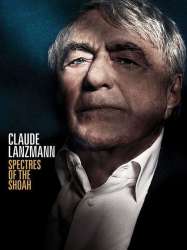 , 40minutes
, 40minutesOrigine Etats-Unis
Genres Documentaire
Thèmes Le racisme, Religion, Documentaire sur le monde des affaires, Documentaire sur le cinéma, Documentaire sur la discrimination, Documentaire sur le droit, Documentaire sur la guerre, Documentaire historique, Documentaire sur la religion, Politique, Religion juive, Documentaire sur la Seconde Guerre mondiale
Acteurs Claude Lanzmann, Marcel Ophuls, France Roche, Jean-Paul Sartre
Rôle lui-même (images d'archive)
Note67%





Centré sur un entretien où Claude Lanzmann revient sur sa vie et sur la réalisation de Shoah - les choix initiaux, les embûches, les dangers, la recherche de moyens pour mener à bien cette entreprise, l’épuisement…, Adam Benzine donne aussi à voir des fragments des rushes de Shoah.

Le Désordre à vingt ans (1967)
, 1hRéalisé par Jacques Baratier
Origine France
Genres Documentaire
Acteurs Louis Arbessier, Antonin Artaud, Roger Blin, Marie-Hélène Breillat, Blanchette Brunoy, Philippe Clay
Rôle lui-même
Note67%





À partir de son court métrage Désordre, tourné en 1947-48, Jacques Baratier revisite, vingt ans après, le quartier parisien de Saint-Germain-des-Prés. Confrontation de ce proche passé avec les années 1960, foisonnement culturel et intellectuel, variations autour de l'existentialisme...

Avec André Gide (1952)
, 1h29Réalisé par Marc Allégret
Origine France
Genres Documentaire
Thèmes Documentaire sur l'art, Documentaire sur une personnalité
Acteurs Jean Desailly, Gérard Philipe, Jean-Louis Barrault, Roland Alexandre, Roger Vadim, Renée Faure
Rôle Self (scenes deleted)
Note68%





Portrait intime d'André Gide, illustré d'archives personnelles de Gide, mais qui retrace aussi l'œuvre de Gide, ses rencontres (Jean-Paul Sartre, Antoine de Saint-Exupéry, etc.), la NRF...

Désordre (1950)
, 18minutesRéalisé par Jacques Baratier
Origine France
Genres Documentaire
Acteurs Annabella, Blanchette Brunoy, Jean Cocteau, Sophie Desmarets, Jean Genet, Juliette Gréco
Rôle Lui-même
Note58%





Dans le quartier de Saint-Germain-des-Prés, à Paris, au lendemain de la Seconde Guerre mondiale, des rencontres témoignent de l'émancipation de la jeunesse et du bouillonnement créatif dans le domaine des arts.
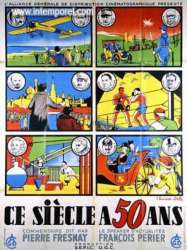
Ce siècle a cinquante ans (1950)
Origine France
Genres Documentaire
Acteurs Pierre Fresnay, Sarah Bernhardt, Jean Cocteau, Marie Daëms, Catherine Erard, Renaud Mary
Rôle Self (archive footage)
Note49%






La Vie Commence Demain (1950)
, 1h27Réalisé par Nicole Védrès
Origine France
Genres Drame, Documentaire
Acteurs Jean-Pierre Aumont, Jean-Paul Sartre, Jacques Prévert, Darius Milhaud, Charlie Chaplin, George Bernard Shaw
Rôle lui-même
Note63%





Un jeune provincial, incarné par Jean-Pierre Aumont, cherche à gagner Paris en faisant de l'autostop. Ce n'est pas une voiture qui le recueille mais un hélicoptère conduit par un journaliste. Celui-ci incite le jeune homme à rencontrer le père de l'existentialisme, Jean-Paul Sartre, puis un psychanalyste éminent, Daniel Lagache. Le provincial apprend que
Scénariste

L'Enfance d'un chef (2016)
, 1h55Réalisé par Brady Corbet
Origine Etats-Unis
Genres Drame, Horreur
Thèmes Politique
Acteurs Robert Pattinson, Liam Cunningham, Bérénice Bejo, Stacy Martin, Yolande Moreau, Michel Subor
Rôle Auteur
Note61%





Un jeune Américain grandissant en France à la fin de la Première Guerre mondiale assiste aux tractations du traité de Versailles, qui ont sur le développement de sa pensée une grande influence.
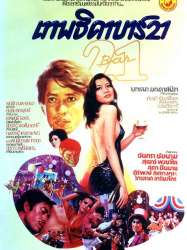
Angel of Bar 21 (1979)
, 2h15Genres Drame, Comédie musicale, Musical
Rôle Ecrivain
Note58%





Au bar 21, les hommes peuvent oublier leurs problèmes dans l'alcool, entourés de belles femmes. L'hôtesse Linda Wongsue (ลินดา) décide d'abandonner son travail dans ce bar pour retrouver son petit ami, Parn (พันธุ์), dont elle paie les études depuis quatre ans. Elle va à Chiang Maï pour la cérémonie de remise des diplômes de l'université. Mais dès que son petit ami a son diplôme en poche il rompt sa promesse de mariage et la largue. Linda retourne alors en train à Bangkok. Dans le train trois jeunes de la haute société la harcèlent; deux jeunes paysans, Sing (สิงห์) et Rot (รอด) , la défendent. Rot est tué. Les trois voyous, bien que l'un d'eux soit Akom, le fils d'un député, sont immédiatement arrêtés par la police et mis en prison pour assassinat. Mais les ennuis continuent... Linda rencontre le fils d'une riche famille, le gentil Thanong (ทนง).

Le mur (1967)
, 1h31Réalisé par Serge Roullet
Origine France
Genres Drame
Acteurs Peter Kassovitz
Rôle Ecrivain
Note66%





Pendant la guerre d'Espagne, trois hommes ont été arrêtés et emprisonnés par les troupes franquistes. Condamnés à mort, ils passent ensemble leur dernière nuit dans la prison où un médecin belge s'est joint à eux pour, dit-il, les réconforter. L'un des trois pourra avoir la vie sauve en échange d'une dénonciation.
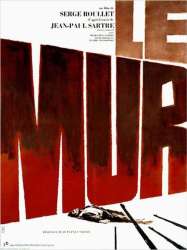
Le mur (1967)
, 1h30Réalisé par Serge Roullet
Origine France
Genres Drame
Acteurs Peter Kassovitz
Rôle Ecrivain
Note66%





Pendant la guerre d'Espagne, trois hommes ont été arrêtés et emprisonnés par les troupes franquistes : Pablo est un ouvrier ami de l'anarchiste Ramon, Tom s'est engagé dans les Brigades internationales et Juan, encore adolescent, est le frère d'un militant. Condamnés à mort, ils passent ensemble leur dernière nuit dans la prison où un médecin belge s'est joint à eux pour, dit-il, les réconforter. L'un des trois pourra avoir la vie sauve en échange d'une dénonciation.

A puerta cerrada (1962)
Genres Drame
Thèmes Adaptation d'une pièce de théâtre
Acteurs María Aurelia Bisutti, Inda Ledesma, Duilio Marzio, Frank Nelson
Rôle Auteur

Les Séquestrés d'Altona (1962)
, 1h54Réalisé par Vittorio De Sica
Origine Italie
Genres Drame, Historique
Thèmes Théâtre, Adaptation d'une pièce de théâtre
Acteurs Sophia Loren, Maximilian Schell, Fredric March, Robert Wagner, Françoise Prévost, Gabriele Tinti
Rôle Pièce de théatre
Note67%





L'industriel Albrecht von Gerlach découvre qu'il est près de mourir et fait venir à lui son fils avocat Werner qu'il souhaite nommer comme son successeur. Sa femme Johanna, actrice engagée dans une œuvre de Brecht contre le nazisme découvre, les secrets de famille : le fils aîné Frantz, criminel nazi de la SS tenu pour mort, se cache en fait depuis seize ans dans le grenier. Il est servi par sa sœur qui lui décrit une Allemagne défaite et humiliée encore sous le joug des envahisseurs.
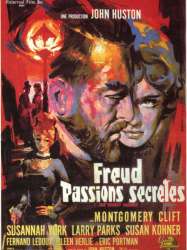
Freud, passions secrètes (1962)
, 1h56Réalisé par John Huston
Origine Etats-Unis
Genres Drame, Biographie
Thèmes Psychologie, Psychanalyse
Acteurs Montgomery Clift, Susannah York, Susan Kohner, Fernand Ledoux, Larry Parks, David McCallum
Rôle Ecrivain
Note71%





Le jeune Sigmund Freud se rend à Paris pour rencontrer le professeur Charcot, dont les travaux sur l'hypnose l'intéressent. Revenu à Vienne, il poursuit ses propres recherches, malgré l'opposition de son entourage. Seul le docteur Breuer le soutient...

Huis clos (1962)
, 1h25Réalisé par Orson Welles, Tad Danielewski
Origine Etats-Unis
Genres Drame
Thèmes Adaptation d'une pièce de théâtre
Acteurs Viveca Lindfors, Rita Gam, Ben Piazza, Mirta Miller
Rôle Histoire
Note66%





Le Valet (Manuel Rosón) entre dans une chambre d'hôtel avec Joseph Garcin (Morgan Sterne) à la remorque. La chambre sans fenêtre a une seule entrée et aucun miroir. Deux femmes, Inès Serrano (Viveca Lindfors) et Estelle Rigault (Rita Gam), sont ensuite dirigées; après, le Valet quitte et verrouille la porte. Réalisant qu'ils sont en enfer, le trio s'attend à être torturé; Cependant, aucun tortionnaire n'est disponible. En attendant, ils entament une conversation et discutent des péchés, des désirs et des souvenirs désagréables de chacun. Adaptation de la pièce de Jean-Paul Sartre.

Les Sorcières de Salem (1957)
, 2h37Réalisé par Raymond Rouleau
Origine France
Genres Drame, Historique
Thèmes Magie, La prison, Religion, Théâtre, Mise en scène d'une sorcière, La peine de mort, Adaptation d'une pièce de théâtre
Acteurs Simone Signoret, Yves Montand, Mylène Demongeot, Jean Debucourt, Alfred Adam, Pierre Larquey
Note71%





Au XVII siècle, dans le petit village de Salem dans le Massachusetts, pour se venger de sa maîtresse Elisabeth Proctor qui l'a renvoyée à cause de la relation adultère qu'elle avait avec son époux, la servante Abigail Williams se livre à la sorcellerie. Arrêtée, elle prétend être une victime et la cour de justice formée à cette occasion va alors envoyer à la potence toutes les personnes dénoncées comme sorcières par les jeunes filles qu'Abigail a eu le temps de mettre en son pouvoir.
 Connexion
Connexion





